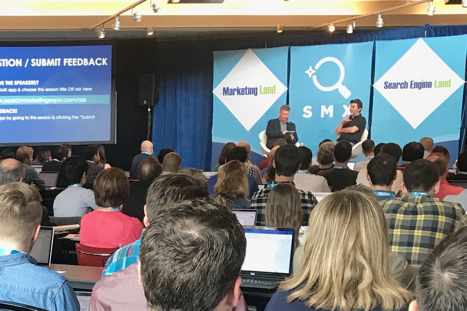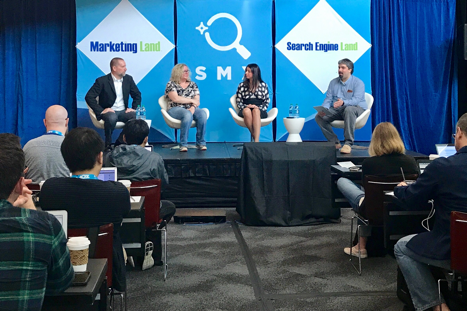SEO
SMX Advanced 2017 was a powerhouse of industry leaders discussing data-backed case studies and their insights into mobile-first indexing, visually-engaging content, Google algorithms, and the increasingly collaborative nature between UX and SEO.
Gary Illyes kicked off by answering some of the most pressing questions facing SEO today.

On stage: Left – Moderator Danny Sullivan, Search Engine Land, Right – Gary Illyes, Google
Should Mobile-First Replace the Desktop Index We Have Now?
“Ultimately that’s the goal,” said Illyes. “Right now, if you have some content on your mobile pages that you don’t have on your desktop pages, then there’s no way in heaven that you will rank with that particular content anywhere on Google.”
To prepare for mobile-first indexing, Illyes suggested copying content you want to rank for, and any structured data, to a mobile site. If you already have a responsive site, there should be nothing to worry about.
What’s the Timeline for Mobile-First?
“We don’t have a timeline for the launch of mobile-indexing, but it’s probably many quarters away,” said Illyes. “We want to allow plenty of time for everyone to be prepared for the mobile first index.”
Mobile-First over Desktop-First – Why Not Have Two Different Indexes?
During SMX Advanced, Illyes admitted that this is a question that keeps coming back internally at Google. However, it was decided that due to the sheer complexity involved with having two different indexes, it was likely not a good idea.
Google has also seen user engagements favoring mobile over desktop, and global data speaks for itself.
- According to Kleiner Perkins Caufield Byers mobile technology trends, mobile digital media time in the U.S. is now significantly higher at 51% compared to desktop (42%).
- A recent U.N. report announced more people have mobile phones than toilets.
- Google Consumer Survey recently published that 68% of smartphone users say they check their phone within 15 minutes of waking up in the morning.
- The 2016 Global Mobile Consumer Survey: U.S. Edition produced by Deloitte places the number of times the average consumer checks his or her smartphone at 46 times a day.
What Can Organizations Do to Prepare for a Mobile-First Index?
“If you have a responsive site, then you’re good to go,” assured Illyes. “Typically, if you have a responsive site, the desktop site will be the same as on a responsive site.”
However, Illyes did address that there was a problem with this. Typically, there are fewer links on mobile than desktop and Google is not expecting publishers to update them. To solve this problem, Google is considering smearing the desktop index into mobile index.
Illyes reassured SMX Advanced attendees that when it came to mobile-first indexing (projected for 2018 at the earliest), “Don’t panic.”
What Matters Regardless of Mobile Configuration?
During a panel with Gary Illyes that included Leslie To, Sr. Director of SEO at 3Q Digital, four types of issues were addressed:
- Accessibility – rich media, interstitials and overlays, site navigability
- UX – scaling, text size, tap target & padding, gestures, site search, keyboard and typing
- Site Speed – page speed
- Content – readability score
At the end of the day, this cross-examination of UX and SEO will have a direct impact on site performance.
Google Fred – Can You Tell Us More About It?
“No. If you are hit by Fred, you’ll want to look at the quality of your site,” explained Illyes. “We don’t want to talk about it…these tiny shifts in how we tweak page ranks.”
However, what Illyes did confirm was this: launching this week are two confirmed algorithm updates. But there are many other unconfirmed updates to Google’s core algorithm expected. Improving the user experience and the results of users requires constant future updates.
Though the audience and moderators were left speculating how many shifts had happened and are still expected to happen, Illyes jokingly (or maybe not) said they were on Google Fred’s 127th update.
What is Happening with Google RankBrain?
Nothing new.
“RankBrain allows us to understand better which results will be the best for a user’s query based on historical research data,” explained Illyes.
“We will make sure those results will work well with that query and rank a little higher. We’ve launched RankBrain in almost all languages now and I don’t think anything new will happen. The team is busy working on other things.”
AMPs or PWAs – What Does Google Want us to Do?
“I would think about PWAs as a way to create something that improves the users experience from a point of view other than speed,” said Illyes.
The problem with native apps is that it’s hard to get people to install. With a PWA, people come to your website; they are already using your PWA. PWAs are JavaScript applications. However, the problem with JavaScript is that it’s often developed by people who don’t really care about SEO.
Illyes later went on to explain, “If you already sped up your site considerably, then I don’t recommend you switch it up. The main selling point of AMP is speed.”
Quality Links or Quality Content – What’s More Important?
“Make sure content is writing great quality so SEOs can get great quality links,” said Jacob Virgil, Senior SEO Associate at Red Ventures.
Having a quality link profile, content that is visually engaging and improves the user experience is a factor in how your site performs and ranks.
Illyes later went on to say that, “Low quality URLs may only be crawled every three months…and if you are buying links, it’s extremely likely you are throwing money out the window.”
Will Over-Optimization Hurt You?
Yes.
“It’s like putting on too much makeup,” said Illyes, “If you put on too much makeup, if it’s like you have an over-optimized face and it’s weird.
Well said, Gary.
Final Takeaways from SMX Advanced 2017 in Seattle
Postali is proud to take part in industry conferences like SMX Advanced. They are an opportunity for SEO and SEM professionals to not only engage with industry leaders and return with fresh ideas for our clients, but to be a part of a larger technology and marketing conversation.

From Left to Right – Jeff Preston, Disney Interactive; Marie Haynes, HIS Web Marketing; Olga Andrienko, SEMrush; Barry Schwartz, Search Engine Land

Not sure where to begin?
Get started with a marketing audit.

